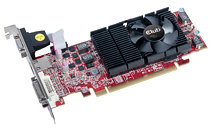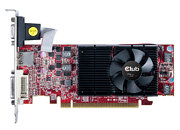Thursday, February 20th 2014

Club 3D Introduces Radeon R7 250 Low Profile and R7 250X Graphics Cards
Today we have two new members of the mainstream Club 3D Radeon R7 family to show you. The new Radeon R7 250 Low Profile and R7 250X.
Until now the cards in the R7 series use the Standard Profile. But traditionally there is a strong demand for a capable card in Low Profile form factor, to be used mainly in a powerful HTPC system or a variety of custom applications. For these purposes Club 3D now adds the new Radeon R7 250 Low Profile to the range.Fitted with 512 stream processors, a clock speed of up to 800 MHz, 1 GB GDDR5 memory at 4500 MHz and 128 bit memory bus, the Radeon R7 250 LP's TDP is only 67 Watts. This makes it the fastest Club 3D card that doesn't require supplementary power. Therefore the R7 250 Low Profile is an ideal choice for upgrading existing systems without the need of upgrading the Power Supply. The small size enables the card to be fitted in most Small Form Factor (SFF) systems while the small cooler with alloy heat sink ensures a quiet operation. The R7 250 Low Profile has D-Sub, HDMI and dual link DVI-D outputs.
The new Radeon R7 250X closes the gap between the R7 250 and 260X.
With a suggested end user price of $99 excluding sales tax this card comes in the Standard Profile and offers 640 stream processors, a clock speed of up to 1000 MHz, 1GB GDDR5 memory at 4500 MHz and 128 bit memory bus. The R7 250X is fitted with a large fan active cooler and alloy heat sink which keep the card cool and quiet under any circumstance.
At its price point of less than $100 this is the highest performing GPU available in the market, offering competitive 1080p gaming in all current and upcoming DirectX11 game titles.
For any new build or upgrade of an existing system where an affordable discrete graphics card is needed for casual gaming, heavy multimedia or office use, the Radeon R7 250 Low Profile and R7 250X are the cards of choice.
Until now the cards in the R7 series use the Standard Profile. But traditionally there is a strong demand for a capable card in Low Profile form factor, to be used mainly in a powerful HTPC system or a variety of custom applications. For these purposes Club 3D now adds the new Radeon R7 250 Low Profile to the range.Fitted with 512 stream processors, a clock speed of up to 800 MHz, 1 GB GDDR5 memory at 4500 MHz and 128 bit memory bus, the Radeon R7 250 LP's TDP is only 67 Watts. This makes it the fastest Club 3D card that doesn't require supplementary power. Therefore the R7 250 Low Profile is an ideal choice for upgrading existing systems without the need of upgrading the Power Supply. The small size enables the card to be fitted in most Small Form Factor (SFF) systems while the small cooler with alloy heat sink ensures a quiet operation. The R7 250 Low Profile has D-Sub, HDMI and dual link DVI-D outputs.
The new Radeon R7 250X closes the gap between the R7 250 and 260X.
With a suggested end user price of $99 excluding sales tax this card comes in the Standard Profile and offers 640 stream processors, a clock speed of up to 1000 MHz, 1GB GDDR5 memory at 4500 MHz and 128 bit memory bus. The R7 250X is fitted with a large fan active cooler and alloy heat sink which keep the card cool and quiet under any circumstance.
At its price point of less than $100 this is the highest performing GPU available in the market, offering competitive 1080p gaming in all current and upcoming DirectX11 game titles.
For any new build or upgrade of an existing system where an affordable discrete graphics card is needed for casual gaming, heavy multimedia or office use, the Radeon R7 250 Low Profile and R7 250X are the cards of choice.


11 Comments on Club 3D Introduces Radeon R7 250 Low Profile and R7 250X Graphics Cards
okay, I hate to be that guy, but PLEASE look at your own site. the r7 250 has 384 stream processors, not 512. I understand that this is a press release, but, really? not even an edit disclaiming that the press release gave the wrong specs?
And I still think this is a pathetic card, given the 512 shader 7750 slow profile from sapphire draws slightly less power than this thing, but is undeniably faster.
EDIT: even AMD claims 384 stream processors. I dont know where Club got the 512 number.
According to Techpowerup's GPU database, the card has 384 stream processors www.techpowerup.com/gpudb/2459/radeon-r7-250.html
"At its price point of less than $100 this is the highest performing GPU available in the market, offering competitive 1080p gaming in all current and upcoming DirectX11 game titles."
That is a complete lie. many 7770 cards can be found for sub-$100.
How did this piece of garbage press release even get posted?
Also while I'm at it, why do they state the TDP at 61W?
800Mhz core clock HD 7750 TDP is 55W and your GPU DB has 55W listed for both the 7750 and R7 250 512SP Ed.
They both have the same core and mem clock and GDDR5. So 61W is kinda odd especially when compared to your HD 7750 review's power consumption numbers where the three HD 7750's clocked between 800Mhz and 820Mhz only draw under max load between 43-46W.Yeah, sure it's a nicer looking card but it's weaker.
384:24:8 @1000Mhz vs 512:32:16 @800MhzOh for crying out loud.
This R7 250 LP is a HD 7750 rebranded. Literally.
Also
www.techpowerup.com/gpudb/2559/radeon-r7-250-512sp-edition.html
Idiot.
after some google-fu, the only other model i found was from xfx, who sell it with a 1 GHz clock rate. maybe THATS where the additional power number came from, and club3D just used the same number rather than measuring the consumption of their own card?
AMD's naming is just driving me nuts, though. The 250/255/250x/250 LP's are a recipe for confusion.
You would think perhaps the 255 is the best card here, given that it's the highest number. but it appears it's not.
From what I can gather from the internet, the cards are this:
R7 250 -> 384 shader card.
R7 250X -> 640 shader card (7770 rebadge)
R7 255 -> 512 shader card! 7750 rebadge?
Now theres an R7 250 LP -> 512 shader card (7750 rebadge)
Is this right? Two different 7750 rebadges?
Also, I'd like to point out that I said "This R7 250 LP" as in this card we are talking about (Club3D R7 250 LP) in this TPU news article. I did not say the actual GPU is called R7 250 LP. Since it really is called R7 250 512SP Edition which is Cape Verde Pro or in other words the HD 7750 rebranded.
What review?
You could have just went to www.techpowerup.com/gpudb/ (like you were blaming TPU to go and look at their own site, why don't you do your research?) and just scroll a little bit down to see the R7 250 512SP Edition listed there, click on it and see "Rebranded HD 7750" and this Club3D card listed there.
Also yeah, there is a XFX R7 250 Low Profile but that card actually is a R7 250.
See here
www.techpowerup.com/gpudb/2459/radeon-r7-250.html
384 core with 1000Mhz clocks and it's TDP is 65W not 61W.
The Sapphire Ultimate and a version with a fan.
I wish sombody had specs on how well it performed with an A10 7850K since the shader counts match up. It should out perform the 384 version in Dual graphics and seems to be the Ideal card for the 7850K